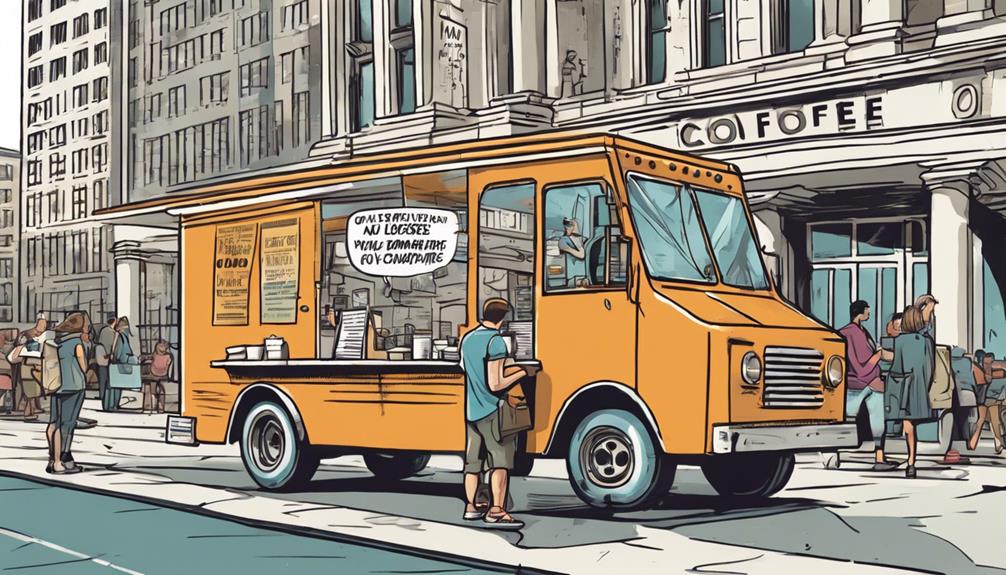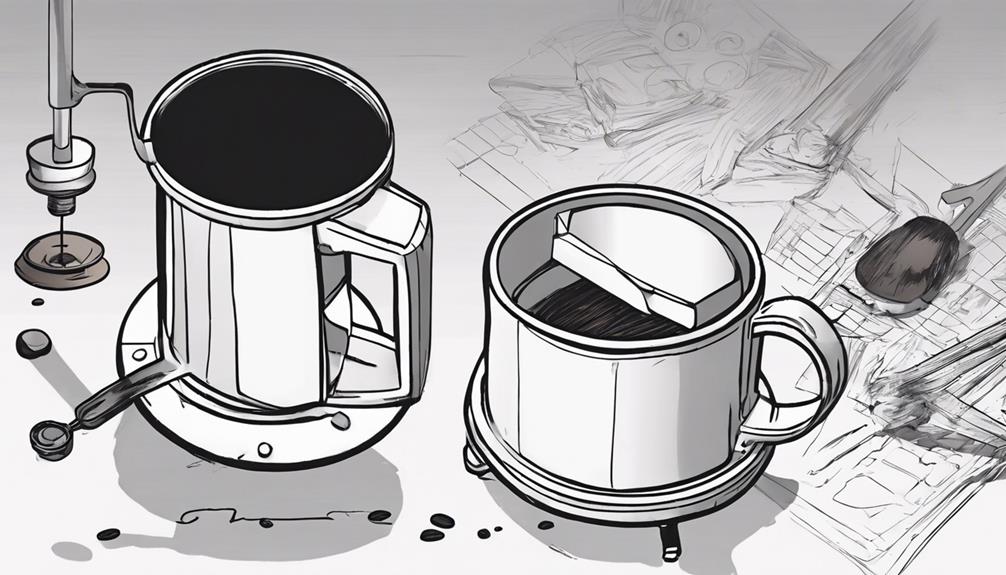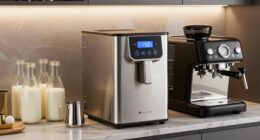To create a successful coffee truck for mobile sales, it is important to carefully plan your budget and choose the right equipment. Develop a detailed business plan that aligns with your concept and menu. Ensure compliance with health regulations and necessary permits for smooth operations. Tell a compelling brand story and interact with customers on social media. Offer special promotions to stand out. Concentrate on revenue targets, streamline operations, and increase profit margins. Take into account important items such as high-quality appliances and legal compliance. Embrace the stages of defining your model, designing your truck, branding, operational efficiency, and growth opportunities.
Key Takeaways
- Plan budget for equipment, permits, and supplies.
- Select efficient equipment for brewing and storage.
- Obtain necessary permits for vending and health regulations.
- Design truck layout for optimal workflow and compliance.
- Implement creative branding and marketing strategies.
Budget Planning for Coffee Truck Business
When starting a coffee truck business, careful budget planning is necessary to determine the initial investment required. Costs for a mobile coffee business can range from $10,000 to $155,000, depending on factors like truck type and equipment selection.
It’s essential to develop a detailed budget and write a business plan before investing money. Consider purchasing a Complete Coffee Shop Startup Kit to streamline the process. This kit can provide essential items needed to kickstart your business efficiently.
Additionally, equipment selection plays a crucial role in budget planning. Aligning the equipment with your concept, budget, and menu is key to ensuring a smooth operation. By carefully considering costs and investing in the right tools from the startup kit, you set your coffee truck business up for success right from the beginning.
Proper budget planning is the foundation for a solid start in the mobile coffee industry.
Equipment Selection and Business Planning

When setting up your coffee truck, selecting the right equipment is key. Tailor your choices to fit your business concept, budget, and menu.
Equipment Essentials
Selecting the right coffee equipment is an important step in establishing a successful coffee truck business, aligning with your concept, budget, and menu offerings. When setting up your mobile coffee business, consider the type of coffee you plan to offer and the quality standards you aim to achieve.
Espresso machines are essential for crafting espresso-based beverages, while coffee grinders ensure fresh and consistent coffee grounds. Refrigeration is crucial for storing milk, syrups, and other perishable ingredients. Furthermore, having a reliable power source, such as generators, is essential for flexibility in choosing locations to operate your coffee truck.
Remember to comply with health department regulations when selecting equipment to ensure food safety and cleanliness standards are met. A well-thought-out business plan will guide your equipment selection process, aligning your choices with your operational needs and budget constraints.
Business Blueprint
Choosing the appropriate coffee equipment and developing a solid business plan are fundamental steps to secure the success of your mobile coffee truck venture. When setting up your mobile coffee business, consider the following:
- Equipment Selection:
Choose the right coffee equipment that aligns with your menu offerings and budget. Options range from espresso machines for specialty drinks to blenders for smoothies. Make sure the equipment is efficient and suits the concept of your business.
- Business Plan:
Develop a thorough business plan that outlines your goals, target market, financial projections, and marketing strategies. A well-thought-out plan will guide your business’s growth and help secure funding if needed.
- Local Regulations:
Understand and adhere to local health department regulations to avoid any issues during inspections. Compliance with regulations ensures the smooth operation of your mobile coffee truck and helps build trust with customers.
Regulatory Compliance and Permitting

Managing regulatory conformity and permitting is a pivotal aspect of establishing a mobile coffee truck for on-the-go sales. To guarantee your mobile coffee truck meets all necessary requirements, you must navigate through a variety of regulations and obtain the appropriate permits. This involves working closely with the health department, the Department of Transportation, and other city departments to ensure compliance with health regulations, zoning requirements, and street vending permits. Below is a breakdown of key steps to ponder:
| Regulatory Compliance | Permitting |
|---|---|
| Health department regulations | Obtaining street vending permits |
| Zoning requirements | Collaboration with city departments |
| Detailed documentation | Fee payments |
Adhering to these regulations and obtaining the required permits is essential for the success of your mobile coffee truck business. By staying compliant, you can avoid costly setbacks and operate your business smoothly.
Marketing Strategies for Business Success

When marketing your coffee truck, focus on developing a strong brand identity that resonates with your target audience.
Engage with customers through social media platforms to create a loyal following and drive sales.
Implement unique promotions and marketing strategies to set your business apart and attract new customers.
Brand Identity Development
To guarantee the success of your coffee truck business, focus on developing a strong brand identity through effective marketing strategies.
Here are some key steps to help you in brand identity development:
- Craft a Compelling Brand Story: Establish a brand narrative that resonates with your target audience, showcasing your brand values and mission. This will help in building a strong customer connection and fostering loyalty.
- Utilize Social Media Platforms: Engage with your customers through social media to create brand identity, promote your business, and interact with your audience. Social media can be a powerful tool in establishing brand presence and reaching a wider customer base.
- Implement Creative Marketing Strategies: Stand out from your competitors by implementing innovative marketing strategies and collaborations. Offering unique promotions and loyalty programs can help differentiate your brand, increase customer retention, and attract more customers to your coffee truck.
Social Media Engagement
Engage with potential customers and boost brand awareness by leveraging social media platforms like Instagram, Facebook, and Twitter for your coffee truck business. Create visually appealing posts showcasing your truck, menu items, and promotions to attract followers.
Interact with your audience through comments, direct messages, and polls to foster a sense of community and enhance customer loyalty. Collaborating with influencers, local businesses, and food bloggers can help broaden your reach and increase social media engagement.
Utilize analytics tools to monitor the performance of your social media efforts. Track metrics such as engagement rates, reach, and follower growth to understand what content resonates best with your audience. By analyzing these insights, you can refine your strategy for maximum impact and continue to build a strong online presence.
Unique Promotions Strategy
Implementing unique promotions can be a key strategy in setting your coffee truck business apart from competitors and attracting a loyal customer following.
To make your promotions stand out, consider the following strategies:
- Offer Special Deals: Create enticing promotions like buy-one-get-one-free coffee days or discounts for customers who refer a friend. These special deals can attract new customers and keep existing ones coming back for more.
- Utilize Creative Marketing: Think outside the box with your marketing efforts. Use eye-catching signage, social media contests, or even themed events to generate buzz and excitement around your coffee truck.
- Form Promotional Partnerships: Collaborate with local businesses, events, or influencers to reach a wider audience. Partnering up can help you tap into new customer bases and create mutually beneficial promotional opportunities.
Profitability and Business Coaching

Consider how profitability and business coaching can greatly impact the success of your mobile coffee truck venture. When aiming for profitability in your coffee truck business, it is essential to focus on revenue projections, operational efficiency, and lowering overhead costs. Engaging in business coaching and utilizing inclusive guides can provide valuable insights into strategic marketing and efficient operations, ultimately leading to a more profitable venture.
To illustrate the importance of profitability and business coaching, the following table outlines key factors that contribute to the success of a mobile coffee business:
| Key Factors | Impact on Business Success |
|---|---|
| Revenue Projections | Setting realistic financial goals |
| Operational Efficiency | Streamlining processes for cost savings |
| Lower Overhead Costs | Maximizing profit margins |
| Inclusive Guides | Providing valuable business insights |
| Strategic Marketing | Attracting and retaining customers |
Start Up Items for Coffee Truck

When starting a coffee truck business, essential start-up items include appliances like espresso machines and blenders. To ensure a successful launch, coffee truck owners must consider the following key equipment needs and legal requirements:
- Appliances: Invest in high-quality espresso machines and blenders to craft delicious coffee beverages on-the-go.
- Supplies: Stock up on coffee beans, cups, lids, and other essentials to serve customers efficiently throughout the day.
- Legal Compliance: Obtain the necessary permits for vending and health regulations to operate your coffee truck legally and avoid any issues with authorities.
In addition to these items, don’t forget that the truck or trailer itself is a major start-up item for your mobile coffee business.
Moreover, securing insurance coverage is pivotal to protect your investment and provide coverage against unforeseen events and liabilities.
Phases of Starting Your Coffee Truck Business

To commence on the journey of starting your coffee truck business, you’ll navigate through distinct phases that encompass defining your model, designing your truck, branding and marketing, operational efficiency, and exploring growth opportunities.
Starting a coffee truck begins with defining your model, whether it’s Convenience, Deep Roots, or Event-oriented, without the need of a formal business plan initially.
When designing your truck, focus on equipment placement for workspace efficiency while ensuring compliance with health and safety regulations.
Branding and marketing take center stage in the next phase, where launching your truck with a compelling brand story and creative marketing strategies is important.
Operational efficiency follows, involving workflows establishment, staff training, and inventory management systems for supply tracking.
Lastly, explore growth opportunities by seeking customer feedback, collaborating with partners, investing in technology, and staying informed about industry trends for sustainable growth. Remember, each phase is essential in building a successful coffee truck business.
Frequently Asked Questions
Do Coffee Trucks Make Money?
Yes, coffee trucks can be profitable. Lower overhead costs contribute to potential profitability. Smart choices in location, menu, and marketing impact earnings. Innovation in branding, menu, and operations can boost revenue. Consider competition, preferences, and pricing for success.
How Many Coffees Does a Coffee Truck Sell a Day?
On average, a coffee truck sells around 200 to 300 cups of coffee per day, depending on location and customer traffic. Factors like weather, events, and competition can impact daily sales. Building a loyal customer base and offering quality coffee help maintain consistent sales.
What Is the Profit Margin on a Coffee Cart?
To understand the profit margin on a coffee cart, focus on factors like location, menu pricing, and operating costs. Offering higher-priced specialty drinks and controlling ingredient costs can boost profits. Maximize efficiency and customer loyalty for success.
How Much Water Does a Coffee Truck Need?
You need about 30-50 gallons of water daily for brewing, cleaning, and handwashing on a coffee truck. Tank sizes vary from 30 to 100 gallons. On average, expect to use 1-2 gallons per pound of coffee brewed, depending on your menu and traffic.
Conclusion
So, there you have it! Building a coffee truck for on-the-go sales can be a fun and rewarding business venture. If you’re passionate about coffee and enjoy interacting with customers, then starting a coffee truck could be the perfect choice for you. With the right design and marketing strategy, you can attract a loyal customer base and build a successful business. In fact, you could potentially expand your business in the future and build a coffee table for customers to enjoy their drinks at your brick-and-mortar location.
With careful planning, the right equipment, and a strong marketing strategy, you can hit the ground running and start serving up delicious drinks to your customers in no time.
Remember, Rome wasn’t built in a day, but with determination and a little bit of hustle, your coffee truck empire can rise and shine!









